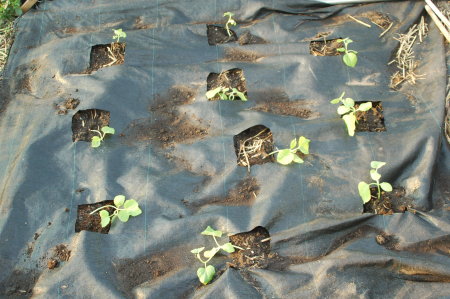Laura of Mas Du Diable recently posted about her disappointment with several orders of seeds received from Chase Organics in the UK.
This company’s use of the word “Organic” is almost humorous, a bit like they think their customers are stupid. First the name of the company Chase Organics. Then their URL, http://www.organiccatalog.com When you load their web page, the title is The Organic Gardening Catalogue. Across the top of the page it says:
The catalogue for organic and environmentally friendly gardeners – organic seeds for vegetables, heritage and modern varieties…
When you finally get down to the Sweetie Corn that Laura purchased, in very small letters is says “(non-organic)”. These are seeds that arrived in a shrivelled state and ended up having less than a 50% rate of germination.
You would think a company that sells “heritage and modern varieties”, according to their blurb across the front of their website would tell you the true nature of their seeds, but they sent Laura F1 seeds in spite of there being no mention of hybrid seeds on the website.
Laura had a similar problem is a previous order where she ordered seeds for an heritage pumpkin variety with the intention of saving seeds. Without asking her permission or informing her, they sent her a different F1 variety instead. Is sending an email in these circumstances really all that hard?
We are all supposed to feel good about a company like this, one that uses the word “Organic” to the point they are truly patronizing their customers. A company that seems somehow to be associated with the HDRA and HSL (both organizations connected with heritage seeds collections and seed saving), and that advertises they sell heritage seeds. Don’t be fooled!
Christina of Calendula and Concrete pointed out in a post that 98% of the world’s seed used to grow food come from one of six companies: Monsanto, Syngenta, DuPont, Mitsui, Aventis, and Dow. This includes 98% of the seeds available for growing by home gardeners. The methods these companies use to promote their products is really extreme and dishonest. They control every aspect of the sale of their seeds, and a company like Chase Organics is bound by a very extensive set of contractual obligations requiring them to promote these commercial varieties above and beyond any heritage varieties that might be sold along side of them and take measures that ultimately lead to frustration to seed savers.
These six large seed companies lose money every time someone is able to save their own seeds and not have to return each year as a customer and buy more. By pretending to sell you heritage variety seeds and leaving you frustrated, they hope to teach you saving your own seeds is just more trouble than it’s worth. By selling you excessively marketed varieties that look special, but in reality are the same varieties commercial farmers use, they want to teach you that supermarket vegetables are “normal” and what you should be growing in your garden. They want you to learn that growing anything else is weird and too much trouble, and marketing terms often include such things as ‘disease resistance’, ‘reliable’ or ‘high yields’ which often have no true meaning except perhaps to farmers.
I cannot emphasize enough that you will be punishing yourself if you buy garden seeds under these circumstances! The seed companies will win in the end, and you will just be left frustrated.
If you want to avoid these tricks the six large seed companies play, you must look for a seed company that does not sell any of their seeds! You must look for a seed company that has a clear and public statement that says they only sell Open Pollinated seeds. It is not good enough that the seeds are ‘organic’, ‘just like your mother grew’, ‘heirloom quality’ or any other marketing term that makes you think the seeds must be heritage varieties. It’s not a secret, and companies don’t just forget to make such a public statement. It’s not good enough if they offer you an explanation in a private email. If you don’t see a clear public statement, look for another company to buy your seeds from.
Better yet, instead of buying seeds, learn how to save your own seeds and trade with other seed saving gardeners.
On the front of this blog are links to a number of seed companies, all of which only sell Open Pollinated seeds. If you live in Europe, the seed laws all but make this kind of seed company illegal. To the best of my knowledge there is one and only one seed company still in existence in Europe that sells only Open Pollinated seeds, and that’s Real Seeds in the UK. Don’t count on Real Seeds being around forever, and be sure to support their efforts by doing business with them and saving their seeds!
A number of US based seed companies will ship overseas, and most countries do not restrict the import of garden seeds. I have not had any serious problems importing seeds into the Netherlands. I don’t think it’s much of an issue to import seeds into the UK.


